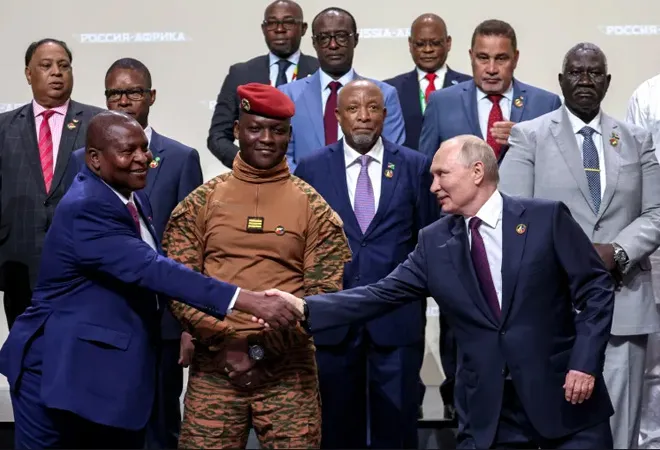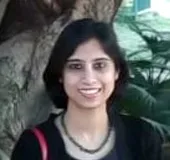-
CENTRES
Progammes & Centres
Location
Although Russia plays an important role in Africa, it still falls short of exercising a wider influence

The second edition of the Russia-Africa Summit was held in St. Petersburg between 27–28 July, 2023. The first summit was held in 2019 in Sochi, Russia, where heads of state of 43 out of the 54 African nations were present. This year, 17 heads of state were present at the summit from among the 49 confirmed attendees, while the remaining were represented by other high-ranking officials.
Russia blamed Western pressure for this but that is hardly the entire story. The concerns of African states about the Russia-Ukraine conflict can be deduced from the voting patterns at the United Nations (UN). In the emergency special session of the UN General Assembly on 2 March 2022, which called for Russia to immediately end its invasion, 28 of the 54 African countries voted in favour of the resolution. Eritrea voted against it while 16 abstained—the remaining nine votes were not recorded. Out of the 28 who voted for the resolution in March 2022, 26 decided not to send their heads of state to the second Russia-Africa Summit. The remaining two—Egypt and Libya—have significant links to Russia. In 2019, 19 of these 26 sent their heads of state to the Sochi Summit. Russia was under sanctions even then over its annexation of Crimea in 2014, so clearly the 2022 invasion marked a distinct shift in how these states perceive Russian actions and that they are opposed to it. This is to argue that the downgrading of attendance by some African countries is not simply a function of Western pressure but is also driven by their interpretation of the ongoing war. At the same time, there is no united African bloc opposed to Russia, given the differences in the voting pattern of the 54 states and the presence of only 17 heads of state at the Summit, as well as high-ranking officials (including prime ministers, vice presidents and cabinet-level ministers) from other states.
The concerns of African states about the Russia-Ukraine conflict can be deduced from the voting patterns at the United Nations (UN).
The 2023 Russia-Africa Summit was a revealing representation of what has and has not been working for Russian foreign policy—not only due to the implications of its ongoing invasion. This refers both to ideational as well as practical dimensions of its foreign policy conduct. The new Russian foreign policy concept in its section on Africa talks about a polycentric world and stands in opposition to ‘neo-colonialism’ and promotes ‘protecting traditional spiritual and moral values’. These were recurrent themes at the latest summit, which have been seen as an additional benefit but not transformational in the competitive landscape of Africa. Not only are several African states engaged in cooperation with both the East and the West, as has been argued, but their focus on an independent policy and ‘distancing’ from the West does not necessarily translate into support for Russia.
This was also evident in the rather remarkable absence of major, big-ticket announcements at the second Russia-Africa Summit. President Vladimir Putin’s article on the eve of the summit as well as his address at the plenary session remained thin on highlighting achievements since the last summit in 2019. The key positive references were reserved for military-technical cooperation and agriculture exports, which is hardly a surprise in itself. Russia’s appeal to Africa has been focused on ‘security assistance,’ which the foreign policy concept explains as ‘inter alia, food and energy security, as well as military and military-technical cooperation’. The latest summit, apart from some newer words on information security and prevention of arms race in outer space, essentially reiterated the same themes. Some speculate that while not much seems to have been achieved in official declarations, some behind-the-scenes dealings might have taken place. Others argue that Russian influence would in the future be limited (but effective), and that Russia has the potential to offer something to Africa by focusing on its independent capabilities (information security, artificial intelligence, military-technical cooperation, bilateral technological partnerships, etc.). Russian experts believe there are opportunities available as Africa seeks a diversified portfolio of ties while admitting that a lot of work was needed to realise the ‘potential’ of ties with the continent.
The new Russian foreign policy concept in its section on Africa talks about a polycentric world and stands in opposition to ‘neo-colonialism’ and promotes ‘protecting traditional spiritual and moral values’.
After all, Africa started to figure more prominently in Russian policy only after 2014. The large time-gap since the collapse of the erstwhile Soviet Union meant that Russia not only arrived ‘late to the game,’ it has also been operating from a limited array of capabilities. Moscow has never had a strong economic presence in Africa. In fact, Russia-Africa trade went down from US$20 billion in 2019 to US$18 billion in 2022, with a significant trade deficit for the latter. The goal now is to double the trade figure by 2030. About 70 percent of this trade is concentrated in Egypt, Algeria, Morocco, Senegal, and South Africa. Since 2022, there has been a sharp rise in exports of Russian oil and petroleum products to Africa.
Russia is an important supplier of food grains, and its role has acquired additional value due to its control over the export of Ukrainian grain via the Black Sea route. The Black Sea Grain Deal, that was struck in July 2022 between Russia and Ukraine (brokered by the UN and Türkiye) allowed Ukrainian grain from its ports on the Black Sea (Odesa, Chornomorsk and Yuzhny/Pivdennyi) to be exported, and was linked to efforts to ‘ensure Russian food and fertiliser reach global markets’. This was needed because, after the beginning of the war, Russia had blockaded Ukraine’s Black Sea ports that were critical points for exports of the latter’s grain. This helped stabilise world food prices by bringing 33 million tonnes of Ukrainian grain to the market in the past year.
Russian experts believe there are opportunities available as Africa seeks a diversified portfolio of ties while admitting that a lot of work was needed to realise the ‘potential’ of ties with the continent.
Russia pulled out of the deal in July 2023, attributing it to the non-fulfilment of the agreement on removing restrictions on the sale of its grain and fertilisers, and non-supply to the poorest countries—the supply destinations were not part of the deal. This has led to a rise in grain prices in the international market, adversely affecting the poorest African countries. While Putin announced a free grain supply between 25,000 and 50,000 tonnes to Burkina Faso, Zimbabwe, Mali, Somalia, Eritrea, and Central African Republic (CAR) in the coming months, the African Union President Azali Assoumani has described it as ‘not quite enough’. South Africa clearly expressed its dissatisfaction, noting that African countries were not looking for gifts but rather a resumption of the grain deal. The UN has additionally noted that Ukrainian wheat constituted more than half of the World Food Programme’s (WFP) supplies to some of the poorest countries in the world, including Afghanistan, Djibouti, Ethiopia, Kenya, Somalia, Sudan, and Yemen. The WFP grain purchases under the grain deal, shipped to the countries mentioned above, alone amounted to 725,000 tonnes of grain over the past year.
Primarily, Russia’s influence has been built on arms sales, agricultural exports, energy and mining links as well as through PMC Wagner, a Russian state-funded private military company. Between 2018-22, it accounted for 40 percent of supplies of major arms to Africa as its biggest supplier, followed by the United States (US), China and France at 16, 9.8, and 7.6 percent respectively. Moscow has also entered into military cooperation agreements with about 20 regional states since 2015. Wagner’s presence has been majorly reported in four states—CAR, Mali, Sudan, and Eastern Libya—with some activity also noted sporadically in Mozambique, South Sudan, Madagascar, and lately, Burkina Faso. The use of the Wagner group has clearly helped Russia advance its own presence through mining contracts, protection of oil and gas resources, and providing political strategists and media (dis)information campaigns. In Mali, the military leadership, after taking power, has turned away UN and French support against Islamic extremism in favour of the Wagner group, but the security situation still remains precarious. Broadly, Russian efforts in this domain have been more successful with governments that are military-led or are ‘patrimonial and reliant on large-scale rents for natural resource extraction’.
After the beginning of the war, Russia had blockaded Ukraine’s Black Sea ports that were critical points for exports of the latter’s grain.
Meanwhile, Russia’s weak economic presence is now further imperilled by Western sanctions as well as the long-standing presence of significantly stronger players in Africa—the US, European Union, and China. It does not possess the capacity to bring in investment—contributing less than one percent of the Foreign Direct Investment in Africa—or contribute to the long-term economic development goals of the continent. Its main presence in the continent is concentrated in specific countries and the tools it employs for achieving its goals—in political and economic fields—are very limited. As the continent gains in importance, major powers are already engaged in securing their influence, and even Russian experts acknowledge that unless acted upon with full strength, no one will wait for Moscow in the region.
As it remains locked in a long-term war with Ukraine, these constraints on its foreign policy conduct in Africa are becoming symptomatic of Russia’s broader conduct in regional/global affairs. The anti-West discourse, which Russia has made a cornerstone of its policies, is used instrumentally to a large extent by the non-Western world, where cooperation goes hand-in-hand with diversifying ties to resist domination by any one power. When combined with the myriad struggles of Russia’s key African partners, the looming presence of major powers in the region and Moscow’s own troubles, it reveals the difficulties of building a multipolar world—where despite an increase in choices for the developing world, the power difference with the developed world remains significant.
This does not take away Russian capacity to influence events in specific ways in specific geographies even through limited resources—such as the use of Wagner or agricultural exports—but it does not leave much room for manoeuvre if these do not prove to be sufficient. For a declining power that is engaged in a full-scale war, it is no surprise that Russia’s tools of influence in the developing world remain in short supply, while the latter is wooed by stronger players that can offer solutions to the most critical issues facing them.
This is not to dismiss Russia but rather to point out how it can play an important role in specific areas, and yet falls short of exercising a wider influence. This is as true for Russian presence in Africa as the Indo-Pacific, or as others have argued, Eurasia—which should be a major concern for Russia given its ambitions of being a great power.
Nivedita Kapoor is a Post-doctoral Fellow at the International Laboratory on World Order Studies and the New Regionalism, Faculty of World Economy and International Affairs, National Research University Higher School of Economics, Russia.
The views expressed above belong to the author(s). ORF research and analyses now available on Telegram! Click here to access our curated content — blogs, longforms and interviews.

Nivedita Kapoor is a Post-doctoral Fellow at the International Laboratory on World Order Studies and the New Regionalism Faculty of World Economy and International Affairs ...
Read More +